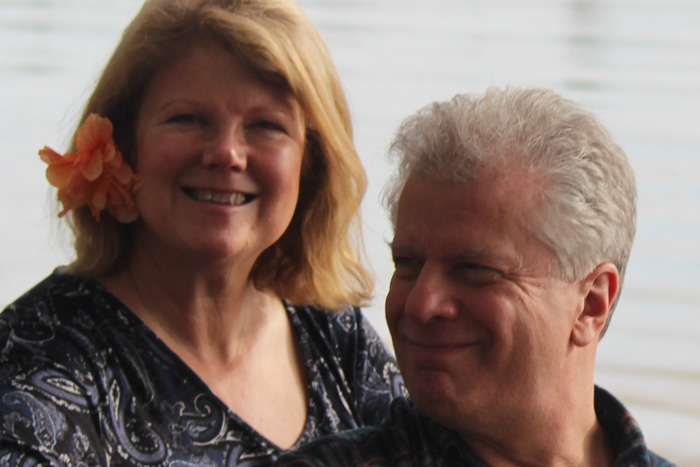Fighting for Truth

Richard ’75 and Catherine Friend White ’78
ALUMNI COUPLE SUPPORTS DATA ANALYTICS, ETHICS EDUCATION
What can you do with a liberal-arts degree? For Richard ’75 and Catherine Friend White ’78, a Dickinson philosophy degree provided a foundation for professional success—and personal fulfillment—in different fields.
They met when each was at a crossroads in life—and also at a crosswalk, a few steps from the Waidner- Spahr Library. Richard, then a handful of months away from his graduation, struck up a conversation with Catherine, who’d just started college four days before.
They quickly discovered commonalities: Both had worked at a lumber company over the summer. Both enjoyed philosophical deep dives, and they could make each other laugh.
“The conversation continued on the other side of the street for a solid hour,” Catherine remembers. A meal at a nearby pizza shop followed, with his roommate in tow.
Solid Foundations
Richard, a philosophy major and student-athlete, planned a career in academia. Though he enjoyed performing in the orchestra, he was much more fascinated by musical structure and form, and his mentor and philosophy professor, Cyril Dwiggins, suggested he look into a career in systems analysis.
Catherine majored in philosophy and French and also excelled in math. A comparative-religions course exposed her to manifold approaches to meaningmaking, while teaching-assistant jobs in philosophy and French helped her understand her major subjects from alternate points of view.
After his graduation, Richard attended grad school at Ohio State, but it wasn’t a great fit. He also missed Catherine. One night he showed up, unannounced, at her apartment in Carlisle, carrying his stereo.
“You know that scene in ‘Say Anything,’ when John Cusack is outside, with a stereo?” Richard asks with a chuckle. “It was like that.”
Except that, bleary-eyed and without her glasses, Catherine initially mistook her long-haired boyfriend for a young woman. “It was the middle of the night, after all,” she adds, laughing.
Finding their Callings
They married and moved to Boston soon after her graduation. Richard took a day course in computer programming while working the night shift. It was an emerging field—punch cards were involved, and the work was much more complex. But, as today, it required continuous learning and also systems analysis—the field his professor recommended. Richard became an IT manager at Fidelity.
Catherine began on the academic route but also became interested in investing. One day, on the subway into Boston and gazing at the skyscrapers for mutual-fund, investment and insurance companies, she wondered if she could get a job in one of those buildings.
“It was an epiphany,” she remembers. “And pretty soon, I had an interview.”
She got the job, earned an M.B.A. from Babson College and went on to become a mutual-fund portfolio manager. Later, she founded an investment business that integrates clients’ environmental and corporate governance beliefs with their financial goals.
Both point to their liberal-arts educations—with foundations in philosophy, critical thinking and ethics—as key to their success.
“We know that a liberal-arts education helps you understand that there are many different views of life and many different ways to approach an issue. That’s incredibly helpful,” Catherine says. “It informs who you become as a professional and as a person—how you live your life, how you approach complex decisions, how you find meaning and process grief, how you determine what is true and right.”
“It’s about liberation,” Richard adds. “A liberal-arts education is supposed to free your thinking and unlock all sorts of paths that you didn’t know were available to
you or didn’t even know existed. And it definitely will do that if you give it a chance.”
Championing Truth
After selling her business, Catherine began work with Golden Seeds, a hybrid venture capital and angel investing concern supporting women entrepreneurs. Current investments include a scientist who’s developed a technology to safely ship and deliver vaccines via film that can withstand ambient temperatures.
“We’re trying to fill a need and make the world better by supporting these brilliant ideas as both investors and mentors,” Catherine says. That’s also the impetus behind the couple’s philanthropy. The Whites are Old West Society members, and Catherine has served as an alumna volunteer. Through their estate, they additionally support Dickinson’s Ethics Across the Curriculum
program and have established a scholarship for Dickinson students studying data analytics.
They view these endeavors as essential to Dickinson’s work in bettering a data-saturated world. “You can use data and technology to inflict terrible harm to society, or you can use it for good. It’s a question of getting better at knowing true from false. And when you apply that question to something as nebulous as data, questions of truth become perhaps even more vitally important,” Richard says. “We want to put our thumbs on the scale of truth.”
Published August 1, 2023